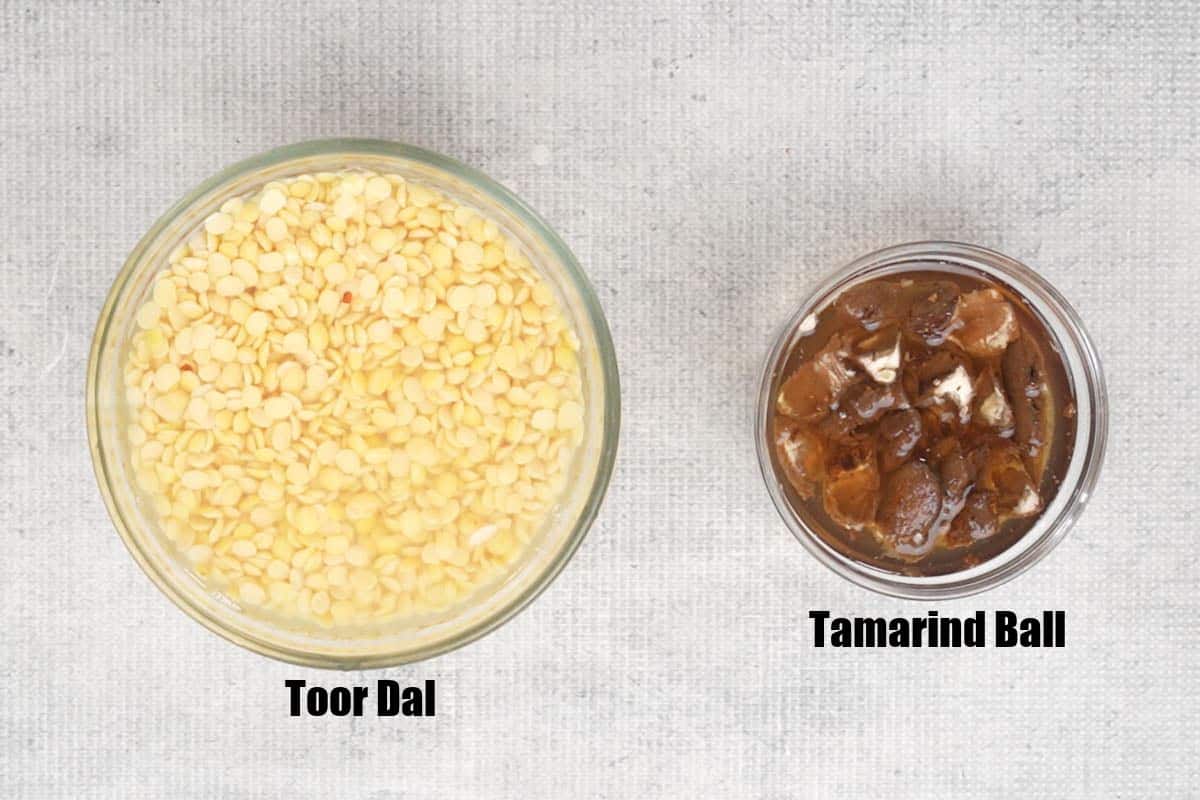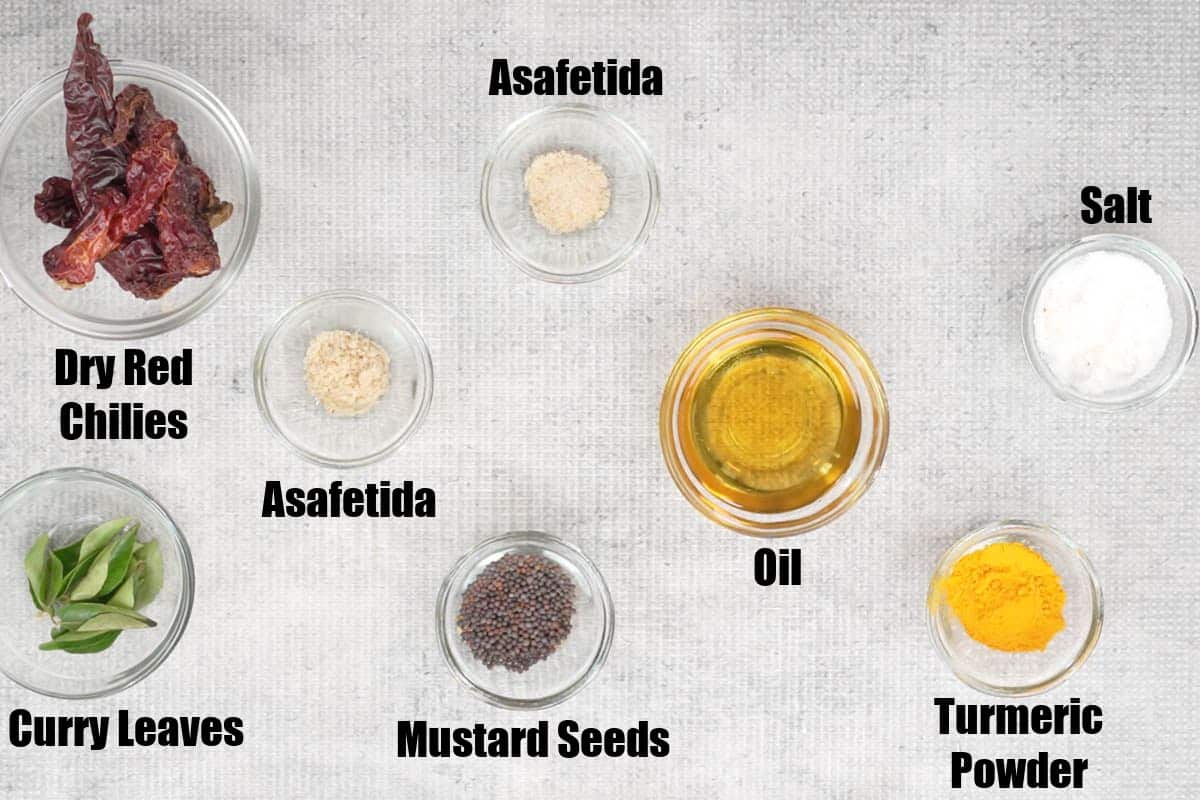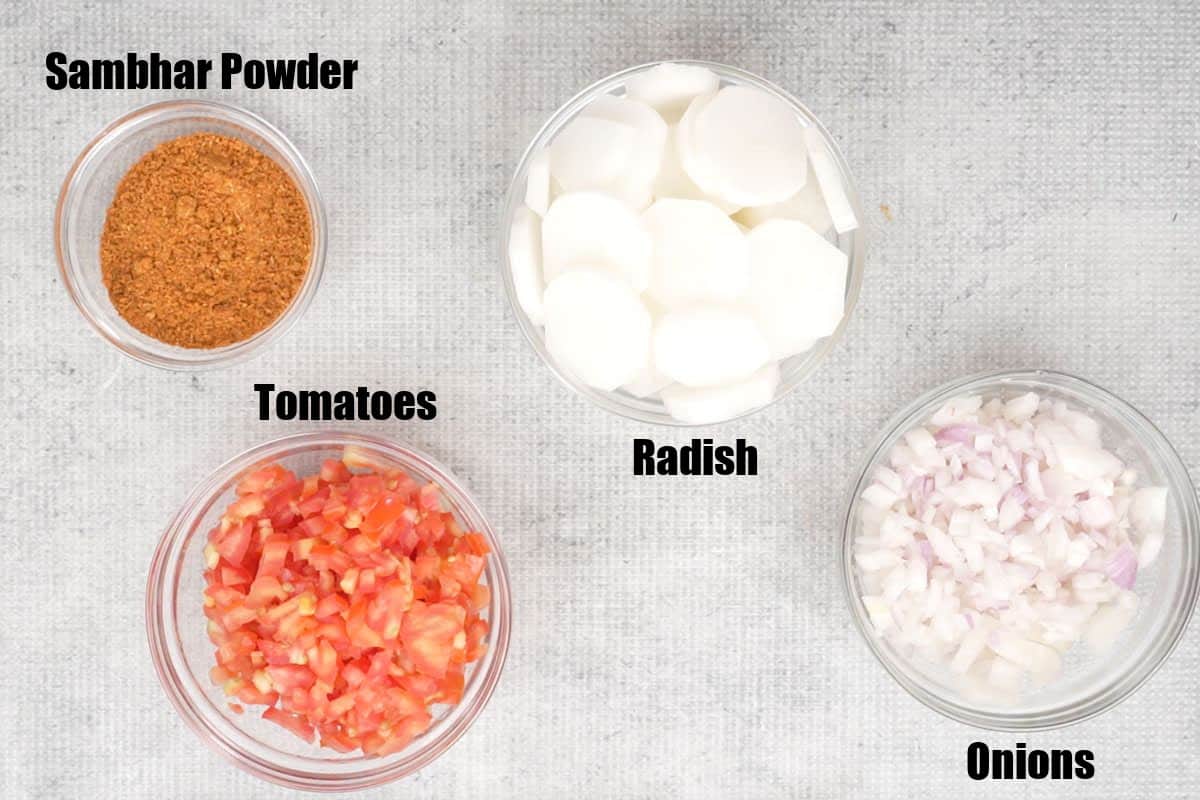on Mar 30, 2021, Updated Oct 04, 2023
About Mullangi Sambar
Mullangi Sambar (Radish Sambar) is a variation of the traditional South Indian sambar preparation, where instead of adding vegetables like carrots, drumsticks, and potatoes, radish is added, giving it a unique taste and flavor. Although mullangi sambar is prepared in almost all of South India, it is particularly popular in Tamil Nadu. Radish, also called mooli, muli, or daikon, adds a unique flavor to radish sambar and a nice bite, which tastes great when paired with idli, dosa, or just simple steamed rice. Make it with or without coconut; it tastes delicious in both versions. This Radish sambar recipe is vegan and you can easily make it gluten-free. Here are a few more easy and comforting South Indian recipes for your everyday meals
Tomato Rasam Classic Sambar Ulli Theeyal Kerala Style Sambar Mor Kuzhambu Pepper Rasam Beetroot Rasam Kerala Rasam
Ingredients
Lentils – This comforting and wholesome radish sambar is prepared with yellow pigeon peas lentils (arhar dal, toor dal). You can replace toor dal with yellow moong dal to make a lighter version. You can also use half and half arhar and moong dal. Radish (Mooli, Daikon) – This sambar uses only one vegetable: radish. This is the ingredient that makes this sambar different from others. Tamarind – This is one of the most important ingredients in sambar. It adds a perfect amount of tanginess that you can’t miss. Sambar Powder – Make sambar powder at home or buy a packet. Oil – Use any cooking oil of your choice. Others – You will also need onions, fresh tomatoes, fenugreek seeds (methi dana), curry leaves, salt, brown mustard seeds, asafetida (hing), dry red chilies, and turmeric powder. If you want the radish sambar to be gluten-free, avoid adding asafetida. For The Tempering – Give the sambar a simple tadka with oil, brown mustard seeds, and curry leaves. Tempering adds a great flavor, so do not miss it. You can also add a little jaggery if you like that little hint of sweetness in your sambar.
How To Make Mullangi Sambar
Preparation
Start by soaking a lime-sized ball of tamarind in ½ cup water. Try to use seedless tamarind as it is easier to use. To save time, you can use 2 tablespoon of ready-made tamarind paste. Wash 8.8 oz (250 g) radish and peel it using a vegetable peeler. Discard ½ inch from the top and bottom and slice it into ¼-inch thick slices.
Cook The Lentils
In An Instant Pot
Wash 1 cup yellow pigeon peas lentils (toor dal) and soak it in water for 20 minutes. Drain the dal and add them to an instant pot along with
3 cups of water 1 teaspoon salt ½ teaspoon turmeric powder
Close the lid and set the valve to the sealing position. Press PRESSURE COOK and set the timer to 12 minutes. Once the timer goes off, let the pressure release naturally for 10 minutes. Release the remaining pressure manually and open the lid.
In A Stovetop Pressure Cooker
Wash 1 cup yellow pigeon peas lentils (toor dal) and soak it in water for 20 minutes. Drain the dal and add them to a pressure cooker along with
4 cups of water 1 teaspoon salt ½ teaspoon turmeric powder
Pressure cook for 1 whistle on high heat. Reduce the heat and cook for 12 minutes. Remove the pressure cooker from heat and let the pressure release naturally.
Make The Masala
Meanwhile, the dal is cooking; heat 3 tablespoon oil in a pan over medium-high heat. Once the oil is hot, add
1 teaspoon brown mustard seeds ¼ teaspoon asafetida 15-20 whole curry leaves 5-6 whole dry red chilies
and let them crackle for 5-6 seconds. Add 1 cup chopped onions and cook on medium heat until they turn pinkish (3-4 minutes), stirring frequently. Add 1 cup chopped tomatoes and cook for 2-3 minutes. Now add 3 tablespoon sambar powder and ½ cup of water and cook for 3-4 minutes.
Make The Sambar
Open the lid of the instant pot (or pressure cooker) and add the masala paste. Add 8.8 oz (250 g) sliced radish to the cooker and mix well. Close the lid again and press PRESSURE COOK again. Set the timer for 4 minutes at high pressure. Once the timer goes off, let the pressure release naturally for 10 minutes. Release the remaining pressure manually and open the lid. Note – If using stove top pressure cook, cook for 3 whistles on high heat. Remove the cooker from heat and let the pressure release naturally. Squeeze the soaked tamarind to remove the pulp, and discard the seeds and the fiber, if there are any. Add the tamarind water to the sambar and mix well. Press the SAUTE button, bring the sambar to a boil, and cook for 2-3 minutes. Note – If using a stovetop pressure cooker, bring the sambar to a boil over high heat. Check for salt and add more if needed.
Temper The Radish Sambar
Heat 1 tablespoon oil in a small pan over medium-high heat. Once the oil is hot, add
½ teaspoon brown mustard seeds 10-12 curry leaves ¼ teaspoon asafetida
and let them crackle for 4-5 seconds. Pour the tempering over the sambar and mix well. Serve hot.
Serving Suggestions
Serve this delicious radish sambar with steamed rice, a dollop of ghee, and papad. You can also serve a thoran or Poriyal on the side. This sambar also tastes great along with idli, dosa, uttapam, Ven Pongal, and Paniyaram.
Storage Suggestions
Mullangi sambar will last in the fridge for about 4 to 5 days when stored correctly in an airtight container. Reheat it in a pan or microwave until nice and warm. If you feel it has become thick, add a little water and adjust the consistency. Reheat only the amount you want to serve, as reheating again and again can decrease its shelf life. You can also freeze it for up to 3 months. Thaw, reheat and serve.
You Might Also Like



























